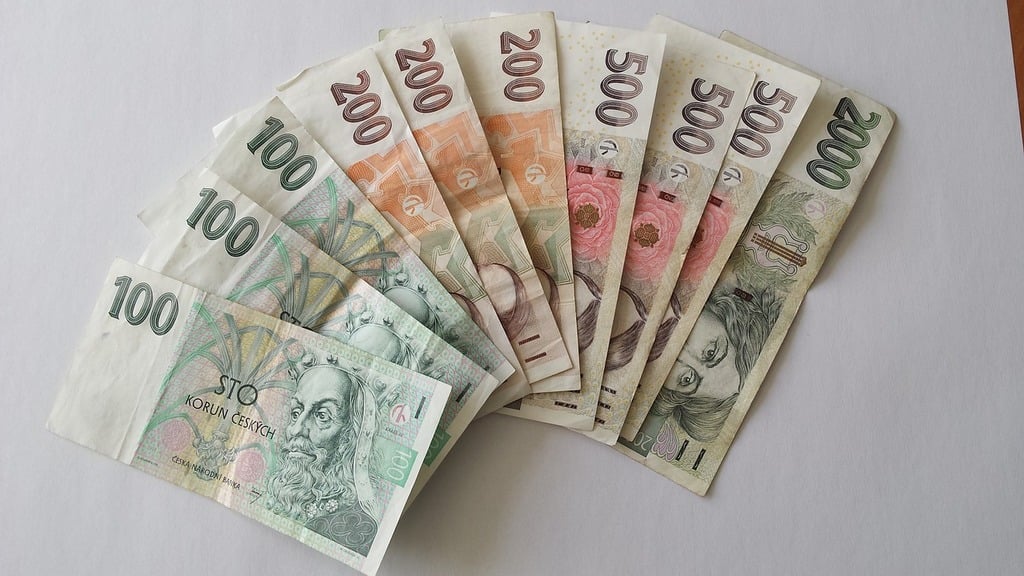Cash, Cards, and Mobile Payments
The official currency is the Czech koruna (koruna česká, symbol Kč, code CZK). One koruna is divided into 100 haléřů, but haléře are no longer used in cash transactions.
Banknotes in circulation: 100 Kč, 200 Kč, 500 Kč, 1,000 Kč, 2,000 Kč, and 5,000 Kč.
Coins: 1 Kč, 2 Kč, 5 Kč, 10 Kč, 20 Kč, and 50 Kč.
💡 Quick example:
- 100 Kč (~€4) = a coffee and cake in a café.
- 500 Kč (~€20) = a good lunch for two in a mid-range restaurant.
- 1,000 Kč (~€40) = admission to Prague Castle for two, plus a tram ride.
| Currency | Code | 1 CZK ≈ |
|---|---|---|
| Euro | EUR | €0.040 |
| US Dollar | USD | $0.043 |
| British Pound | GBP | £0.034 |
| Australian Dollar | AUD | $0.065 |
| Canadian Dollar | CAD | $0.059 |
| Japanese Yen | JPY | ¥6.84 |
Foreign currency is not accepted for payment, except at some hotels or exchange offices, which often use poor conversion rates. Always pay in koruna when in the Czech Republic.
Payment Methods in the Czech Republic
Cash
Cash is still important, especially for:
- Small cafés and pubs
- Farmers’ markets
- Street food stalls
- Public toilets (often 10–20 Kč)
- Coin lockers at stations
Large banknotes like 2,000 Kč and 5,000 Kč are accepted, but smaller bills are preferred in taxis, at small vendors, or when buying a tram ticket from the driver.
💡 Example: If you’re visiting the Astronomical Clock tower, the ticket office takes cards, but the nearby souvenir stall selling wooden toys may be cash-only.
Credit and Debit Cards
Cards are widely accepted in Prague and larger towns. Visa and Mastercard are standard; American Express and Diners Club are less common.
- Hotels, supermarkets, shopping malls: Yes
- Public transport ticket machines: Yes (but older trams/buses may not)
- Small-town restaurants: Maybe — check before ordering
Contactless & Mobile Payments
Contactless card payments are the norm. Apple Pay, Google Pay, and Garmin Pay work in most shops, provided your card is linked to a bank that supports CZ contactless standards.
Local mobile apps like Česká spořitelna George Pay or ČSOB Smart Key are popular with residents but aren’t necessary for tourists.
💡 Tip: Public transport in Prague accepts contactless payments directly at metro gates and tram validators — just tap your card or phone.
How to Get Czech Koruna
Currency Exchange
Exchange at:
- Banks (Česká spořitelna, Komerční banka, ČSOB)
- Official exchange offices (look for “0% commission” signs, but read the fine print)
- Airport and train station exchange offices — only if urgent, as rates are worse.
The Czech National Bank (cnb.cz) publishes the official exchange rate daily.
💡 Example rates (May 2025):
1 EUR ≈ 25.1 Kč | 1 USD ≈ 23.2 Kč
ATMs (Bankomaty)
ATMs are widespread and usually offer good rates. To avoid high fees:
- Use bank-owned ATMs — e.g., Česká spořitelna, ČSOB, Komerční banka, Moneta.
- Avoid independent ATMs (often Euronet, Global) — they charge high fees and offer poor conversion rates.
- Always decline Dynamic Currency Conversion and choose “Continue without conversion” for a better rate from your bank.
💡 Tip: ATMs in Prague city centre sometimes offer English and German menus.
Money-Related Attractions in Prague
1. Czech National Bank Visitor Centre
📍 Na Příkopě 28, Prague 1
Learn about the history of Czech currency, how banknotes are made, and explore interactive exhibits on monetary policy. Free entry; guided tours available in English.
2. Czech Mint Store
📍 Celetná 32, Prague 1
Shop for collector coins, medals, and commemorative gold and silver pieces produced by the Czech Mint.
3. Museum of the Prague Mint (planned)
The Czech Mint occasionally hosts exhibitions and pop-up events in Prague showcasing historical coins, minting techniques, and Czech numismatic heritage.
Safety and Practical Tips
- Theft rates are low compared to many capitals, but pickpocketing can occur in crowded tourist areas — use a secure wallet.
- Always carry some cash for small expenses.
- When paying in restaurants, tip in cash (round up by 5–10%).
